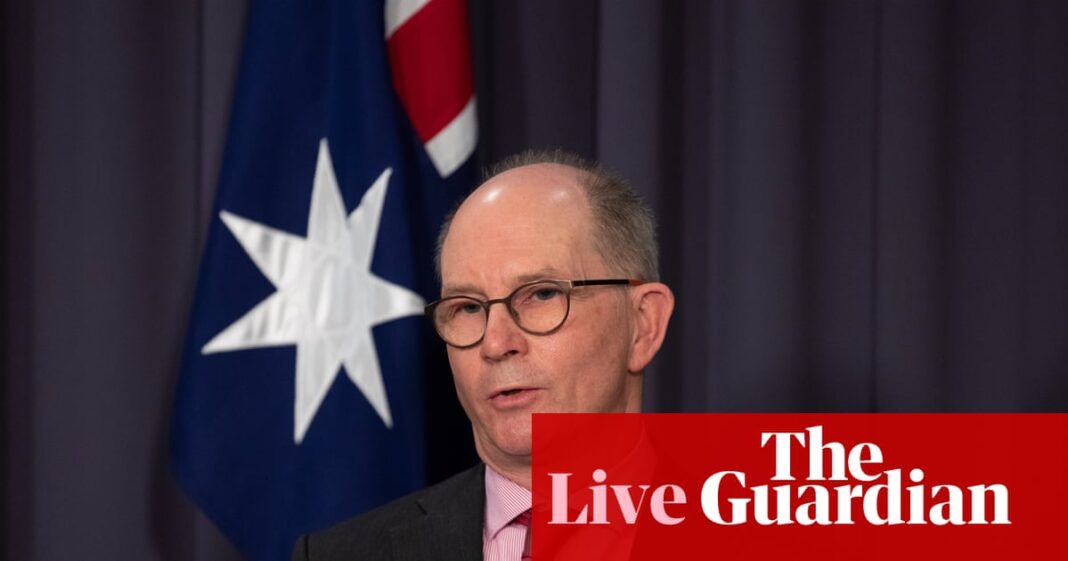Former CMO Paul Kelly: Trump’s announcement ‘cruel’ to pregnant women
Natasha May
Australia’s former chief medical officer says the Trump administration’s announcement tying paracetamol to autism is “cruel” to pregnant women and unnecessarily puts blame on parents of children with autism, without evidence backing it up.
Prof Paul Kelly told Guardian Australia he believed the announcement was a use of “mal-information” – twisting information to reach a certain end:
I don’t think it’s about protecting children from autism. I do worry that it’s part of a smoke screen for larger announcements which may well involve vaccines, which has been a long-held view of the current secretary for health in the Trump administration, Robert F Kennedy Jr.

Kelly also said the announcement goes against the best evidence we have, which was a Swedish study published last year of almost 2.5 million births, “essentially put the issue to bed. There is no link between paracetamol and autism.”
What an announcement like this does do is places blame on parents of children with autism “with no evidence that that’s the case.” Kelly said:
That feeling of blame and of guilt is really common and incredibly dangerous and not a helpful emotion.
He also says it’s “cruel” to tell pregnant women in real pain or experiencing a fever not to take medication that is safe and effective.
Read more about what Australian experts are worried about here:
Key events

Natasha May
TGA aware of Trump’s claims, but says ‘robust studies have refuted’ them
The TGA said it is aware of announcements by the US administration that use of paracetamol in pregnancy may be associated with an increased risk of autism and ADHD in children, though a causal association has not been established.
Their statement continued:
Whilst there are published articles suggesting an association between maternal paracetamol use and childhood autism, they had methodological limitations. More recent and robust studies have refuted these claims, supporting the weight of other scientific evidence that does not support a causal link between paracetamol and autism or ADHD.
… International peer regulators including the Medicine and Healthcare products Regulatory Agency (MHRA) in the United Kingdom have reiterated that paracetamol should continue to be used in line with product information documents. Following evaluation in 2019 the European Medicines Agency (EMA) found that scientific evidence regarding effects of paracetamol on childhood neurodevelopment was inconclusive.
Medicines regulator and nation’s chief doctor reject US paracetamol claims

Natasha May
Australia’s current chief medical officer, Prof Michael Kidd, and the medicines regulator say they “join with other global medicines regulators, leading clinicians and scientists worldwide in rejecting claims regarding the use of paracetamol in pregnancy, and the subsequent risk of development of ADHD or autism in children”.
A statement issued moments ago by the Therapeutic Drugs Administration says:
Robust scientific evidence shows no causal link between the use of paracetamol in pregnancy and autism or ADHD, with several large and reliable studies directly contradicting these claims.
Paracetamol remains the recommended treatment option for pain or fever in pregnant women when used as directed. Importantly, untreated fever and pain can pose risks to the unborn baby, highlighting the importance of managing these symptoms with recommended treatment.
Pregnant women should speak to their healthcare professionals if they have questions about any medication during pregnancy.

Sarah Basford Canales
Defence should not be ‘first port of call’ after disasters, emergency management head says
The head of Australia’s emergency management agency says the army should “not be the first port of call” during catastrophic weather events as he delivered a sobering outlook for the upcoming high-risk season.
In a media briefing this morning, Joe Buffone, acting head of the National Emergency Management Agency (NEMA), spoke of the increase in adverse weather events in recent years, such as floods and bushfires, but said the agency’s work extended to other crises, including those in national security and biosecurity.
Buffone said a key takeaway was that defence should not be called in every time there’s a weather emergency unless it is absolutely critical.
He said:
Defence [has] a critical role in actually defending Australia. That’s their primary role. What they will do, though, is that they still will support, you know, significant disasters – in particular, in the urgent emergency, life-saving space, but they are not looking at continuing to support recovery efforts unless it is of a scale that they need to support. They’ve got to focus on their primary role, which is defending Australia …
The key message is Defence … cannot be the first port of call in a disaster.

Luca Ittimani
AI datacentres could force an early water price hike, regulator warns
The NSW price regulator just announced a price hike for Sydney water but warned another could come early if new datacentres are quick to arrive.
Large volumes of water are used to cool the vast warehouses which store and process data. New AI models such as ChatGPT make heavy use of them.
Open-source estimates suggest Australia already has 265 datacentres, with Amazon among the companies investing billions to build the projects in Sydney and Melbourne, and the NSW government has reportedly approved 90 more.
Sydney Water told the independent pricing and regulatory tribunal it expected such centres to consume up to 250 megalitres a day, about one-sixth of Sydney’s present water consumption. Local councils argued it could be even more than that.
Ipart warned it may need to hike prices earlier than usual if datacentre installations accelerate before the next scheduled 2029-30 review, but for now it believed existing projects could be covered under the existing system. Its report read:
There is a possibility that Sydney Water may need to expand its system capacity materially over the next few years, potentially at significant additional cost. It may also sell more water than we have allowed for in setting prices … [and if so] we may consider reviewing and setting new prices before 2029-30.
Former CMO Paul Kelly: Trump’s announcement ‘cruel’ to pregnant women

Natasha May
Australia’s former chief medical officer says the Trump administration’s announcement tying paracetamol to autism is “cruel” to pregnant women and unnecessarily puts blame on parents of children with autism, without evidence backing it up.
Prof Paul Kelly told Guardian Australia he believed the announcement was a use of “mal-information” – twisting information to reach a certain end:
I don’t think it’s about protecting children from autism. I do worry that it’s part of a smoke screen for larger announcements which may well involve vaccines, which has been a long-held view of the current secretary for health in the Trump administration, Robert F Kennedy Jr.
Kelly also said the announcement goes against the best evidence we have, which was a Swedish study published last year of almost 2.5 million births, “essentially put the issue to bed. There is no link between paracetamol and autism.”
What an announcement like this does do is places blame on parents of children with autism “with no evidence that that’s the case.” Kelly said:
That feeling of blame and of guilt is really common and incredibly dangerous and not a helpful emotion.
He also says it’s “cruel” to tell pregnant women in real pain or experiencing a fever not to take medication that is safe and effective.
Read more about what Australian experts are worried about here:
Why are Sydney’s water bills rising by hundreds of dollars?

Luca Ittimani
As we reported earlier, Sydney Water has gained permission to hike its prices 14% on 1 October.
NSW’s independent pricing and regulatory tribunal says the increase is necessary to cover the rising costs of water distribution. The hike will give Sydney Water an extra $179m per year to cover its day-to-day operations, including rising costs for water purchase and treatment.
The price increase will weigh more on the variable usage charge, which relates to how much water a household uses up, rather than the fixed fee to connect to the water service. As a result, Sydney customers are expected to cut back their water usage in response to the price hike, meaning water usage will stay at about the same level for the next five years despite a growing population.
The fee increase will also cover an increased spend on capital works so Sydney Water can replace ageing infrastructure and build new connections, storm water connections near the new Western Sydney airport and network expansions to cover greater use of the city’s desalination plant
An extra $180m has been allocated toward works on the city’s ocean-draining sewers, which some experts believe are to blame for thousands of debris balls or “fatbergs” washing ashore in the last year.
Difficult weather, among other factors, has made it harder to carry out expansions of networks around the outfall sewers at North Head, Bondi and Malabar. Ipart suggested the additional spend after NSW Health and the Environment Protection Authority called for the sewers to be prioritised. The review read:
We have sought, and will continue, to protect consumers from unjustified price increases for water and wastewater services. However, increases in maximum prices are required now to fund efficient expenditure to deliver reliable and safe water services and to reflect a fair contribution between today’s customers and future customers.

Adeshola Ore
Eighth person charged with murder over Cobblebank stabbing deaths
Victoria police have charged an eighth teenager with murder after the stabbing deaths of 15-year-old Dau Akueng and 12-year-old Chol Achiek in Cobblebank in Melbourne’s west earlier this month.
In a statement, police said a 15-year-old boy was charged in relation to Dau’s death. He is due to appear at a children’s court at a later date.
Last week, police arrested seven males, aged between 15 and 19 after raids on homes in Melbourne’s north and west by homicide squad detectives. They were interviewed by police before charges were laid on Friday afternoon.
A 19-year-old Thornhill man, two 16-year-old boys and a 15-year-old boy were charged with the murder of Dau.
A 19-year-old Caroline Springs man, an 18-year-old Wollert man and a 16-year-old boy were charged with the murder of Chol.

Jonathan Barrett
Myer sees sharp uptick in threatening behaviour against staff
Myer has warned of a steep increase in threatening behaviour against its staff, prompting the retailer to support the use of body cameras and personal safety alarms for employees.
The department store chain said in financial results released today there had been a 79% increase in incidents of threatening behaviour over the past 12 months, including verbal or physical abuse.
The company said:
With customer violence against retail workers on the rise, resulting in significant increases in abuse, and incidents involving weapons, the company supports both government policy and technology-based solutions, such as the roll out of body-worn cameras and personal safety alarms, to equip the Myer team in addressing this growing trend.
The retailer said it had reduced theft levels from the prior reporting period by boosting in-store security and other measures such as employee safety cameras.
Myer shares are being sold off heavily today, down 30%, following the release of its financials. The department store chain reported a 30% slide in annual net profit to $36.8m, excluding impairments.
Penry Buckley
‘Lack of management capability’ at Sydney trains body
The rail review has also identified significant issues with the way the body which runs the day-to-day operations of the city’s trains, the Rail Operations Centre (ROC), responded to the incident.
The review found that the continuation of delays into a second day appeared to be have been caused by “lack of management capability in dealing with an incident of this kind”.
Asked if anyone has been dismissed from the ROC, the Sydney Trains chief executive, Matt Longland, says there have been a “handful of changes”:
I have made a number of changes to the leadership, both in engineering and also in operations, and people have left the organisation … I don’t want to go into the detail of individual circumstances. I don’t think that’s appropriate … we are committed to improve the way of working at the ROC and also in the way that we respond to incidents on site.
Penry Buckley
More than 120 wire issues detected since Sydney trains incident
The NSW transport minister, John Graham, has given a press conference following the releasing of a “sobering” review into rail safety on Sydney’s train network, as we reported earlier.
Graham says since the incident on 20 May a network-wide digital scan has identified 126 additional points of interest on the network, which have now been resolved.
The review, led by transport industry expert Kerry Schott and commissioned after an overhead wire snapped and fell on to the roof of a train, found the wire was first observed to be beyond its operational capacity – or “condemning limit” – during a network-wide inspection commissioned in 2020.
This inspection was outside the normal program of maintenance, and the issues with the wire were not acted on, although it was visually inspected as recently as April this year.
The Sydney Trains chief executive, Matt Longland, says the network has “let down passengers down”:
I do apologise for what they had to experience over those two days. The gaps in process, in technology and in systems, were made very clear by the review team. I think the key standouts were the fact that this wiring fault should not have occurred. It should have been picked up in the inspection process and it could have been avoided. Secondly, the response and the repair took far too long.





